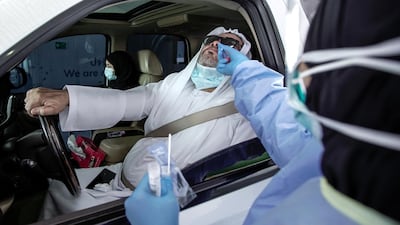The number of coronavirus cases in the UAE continues to rise. The figures, though not as grave as those in many other countries, underscore the seriousness of the pandemic. There is, however, one vital element to remember related to the recent rises in the reported number of cases – testing. Rising numbers are a sign of the scale and reach now being achieved by the UAE’s mass testing programme. Testing is essential to getting a hold on this virus and the UAE is among the countries leading the way.
With a total of 648,195 coronavirus tests conducted thus far in a population of 9.6 million people, the UAE ranks third in the world in terms of screening per capita. Health authorities have been able to detect more than 4,000 cases since the start of the outbreak and have helped 680 patients to recover. Mass testing is important in identifying infected patients early, providing them with adequate care and preventing further infections.
This strategy was most effectively adopted by South Korea in January, a time when the country was second only to China in its number of coronavirus cases. Since then, Seoul has successfully limited new infections, thanks to a comprehensive set of measures.
The UAE has implemented similar strategies. Now, health workers in the UAE have carried out an even greater number of tests overall than their South Korean counterparts. This is especially remarkable considering the UAE has a population one fifth the size of South Korea's.
One of the essential parts to this strategy was the establishment of 14 drive-through testing centres in all seven emirates. These centres were built on the orders of Sheikh Mohamed bin Zayed, Crown Prince of Abu Dhabi and Deputy Supreme Commander of the Armed Forces, in 10 days.
Thousands of tests were conducted across the Emirates on Sunday alone. An imposing laboratory was built in Masdar City, Abu Dhabi, in ony 14 days, to process tens of thousands of coronavirus tests every day.
According to Mohanna Hasan, a dentist working with the centres, the Emirati leadership has ordered the health sector to test as many people as possible with the ultimate aim of having "zero Covid-19 patients in the country".
Achieving such an ambitious target requires a holistic approach, given the coronavirus’s highly infectious nature, which cuts across demographic and socioeconomic categories. That is why nationals and residents are receiving free Covid-19 treatment in the UAE. Populations at high risk of complications from the virus are also tested free of charge, and frontline workers are tested every week.
In addition to introducing essential healthcare policies, the UAE has also boosted its capability to produce high-demand goods locally.
Cost-efficient medical masks are produced in Dubai through 3D printing, and the government has invested in domestic agriculture. Long-term planning is crucial to beating a pandemic that has yet to show signs of abating completely. But only a vaccine and efficient medical treatments can put the final nail in coronavirus’s coffin.
The UAE is at the forefront of the battle for such treatments. Experts are conducting trials on hydroxychloroquine, an anti-malarial drug with some prospect of becoming a treatment for certain cases of Covid-19. Patients are also receiving plasma treatments, which have proven effective in 40 to 50 per cent of recipients and are being adopted in hospitals worldwide.
In these difficult times, successful efforts and effective policies are worth drawing attention to. They give us hope that, in the long run, the world can and will overcome this health crisis.


